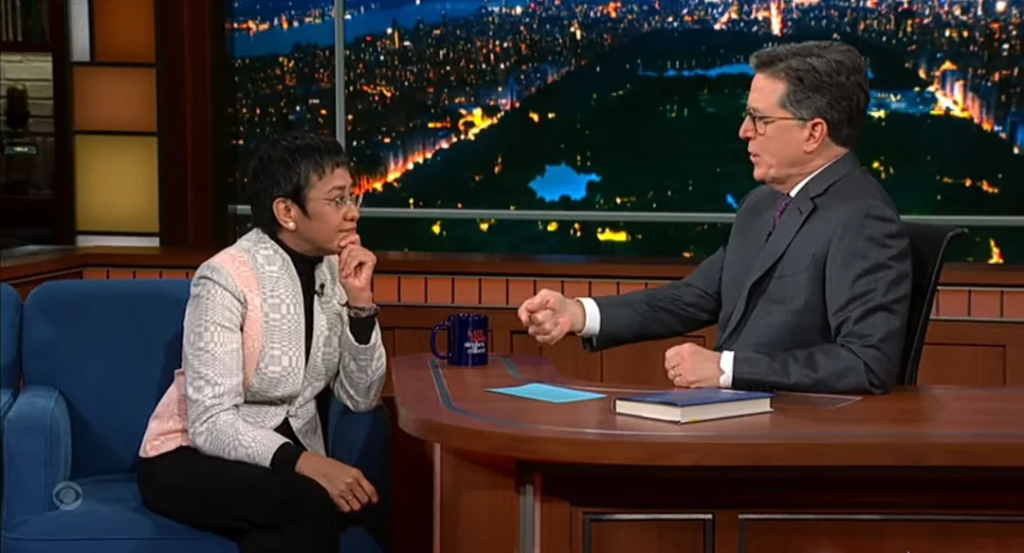Sorry Maria Ressa, censoring speech will not save democracy

Analysis
15:43
The journalist suggested that we can only protect freedom by constraining it
by Peter Franklin

Maria Ressa meets Stephen Colbert
Maria Ressa is a brave woman. Best known for her campaigning journalism against Rodrigo Duterte’s authoritarian government in her native Philippines, she has defied arrest and the threat of a long prison sentence. In 2021 she was awarded the Nobel Peace Prize, along with the Russian journalist Dmitry Muratov.
Her recent comments on the limits of free speech — for instance, in this interview with Stephen Colbert — therefore matter. The context is the blame she attaches to social media for Duterte’s rise to power. Generalizing from the Philippines to other countries, including America, she argues that social media has “come in and used free speech to stifle free speech.” This was met with warm applause from Colbert’s audience of liberal Americans.
The implication, whether Ressa intended it or not, is that we can only protect freedom by constraining it. Up to a point, this contradiction makes perfect sense. Our fundamental liberties, including the right to free expression, are not absolute — hence our longstanding laws against Slander, fraud and incitement to violence. What’s new, however, is the elite push to take the regulation of speech well beyond such limits.
Ironically, given Ressa’s criticism of Facebook, it is the big social media companies that have led the way — for instance, by de-platforming Donald Trump. Governments are getting in on the act too. Earlier this year the Biden administration tried to set up a Disinformation Governance Board within the Department of Homeland Security. The initiative ended in farce, but the impulse to protect democracy by censoring free speech hasn’t gone away.
It can hardly be denied that the internet is a sewer of lies. And that, argues Ressa, is a threat to democracy because “if you don’t have facts you can’t have truth” and that “without truth you can’t have trust”. Consequently, there is “no shared reality, we can’t solve any problems, we have no democracy.”
On the face of it, this is a reasonable analysis — logical, even. Indeed, the causal progression from facts to truth to trust suggests a general solution: the regulation of facts. Furthermore, the focus on social media suggests a specific method: change the algorithm to filter out the lies, and the rest will follow.
Except that people have genuine disagreements about the facts. Can a man become a woman? Is critical race theory essentially correct? How effective are masks at preventing infection? Did the Covid pandemic start in a lab? Is social media to blame for the global decline of democracy? To put it mildly, these are contested matters, which we cannot expect an algorithm or a governance board to settle.
Ressa’s logic is back to front. Rather than democracy being dependent on a “shared reality”, democracy is what allows people to make a free choice between competing views of reality. A truly liberal society is one that can accommodate fundamentally different assumptions about morals, religion, history, economics and even science without falling apart.
By definition, what allows us to agree to disagree is not a single set of accepted facts — but a tradition of tolerance for differing viewpoints. One could argue that this is itself a shared reality, but, if so, what is being shared is not facts, but values — and, in particular, the value of pluralism. We undermine it at our peril.


Comments are closed.